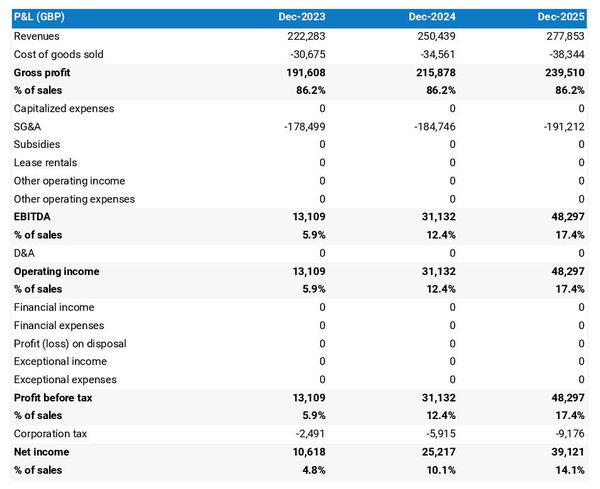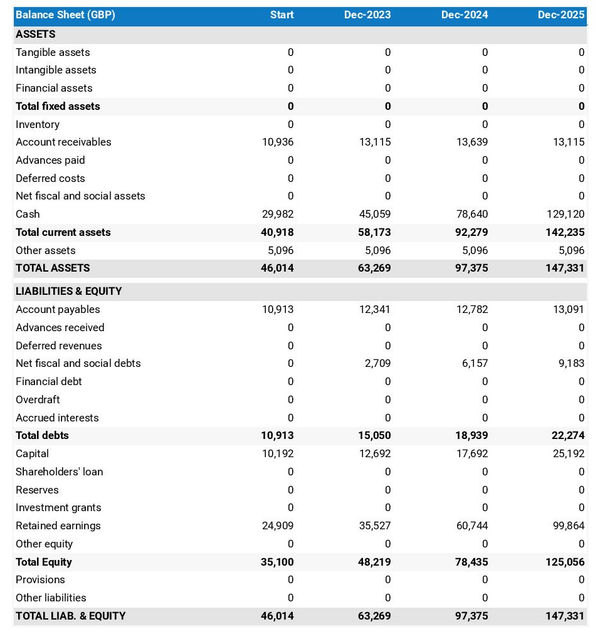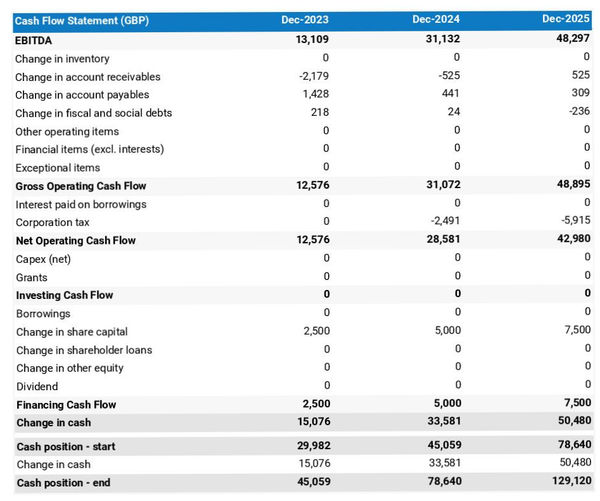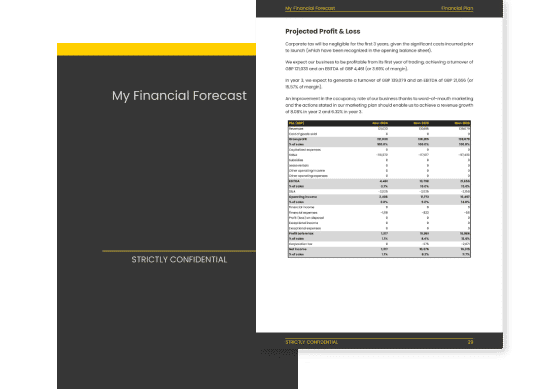How to create a financial forecast for a marketing consulting firm?

If you are serious about keeping visibility on your future cash flows, then you need to build and maintain a financial forecast for your marketing consulting firm.
Putting together a marketing consulting firm financial forecast may sound complex, but don’t worry, with the right tool, it’s easier than it looks, and The Business Plan Shop is here to guide you.
In this practical guide, we'll cover everything you need to know about building financial projections for your marketing consulting firm.
We will start by looking at why they are key, what information is needed, what a forecast looks like once completed, and what solutions you can use to create yours.
Let's dive in!
Why create and maintain a financial forecast for a marketing consulting firm?
Creating and maintaining an up-to-date financial forecast is the only way to steer the development of your marketing consulting firm and ensure that it can be financially viable in the years to come.
A financial plan for a marketing consulting firm enables you to look at your business in detail - from income to operating costs and investments - to evaluate its expected profitability and future cash flows.
This gives you the visibility needed to plan future investments and expansion with confidence.
And, when your trading environment gets tougher, having an up to date marketing consulting firm forecast enables you to detect potential upcoming financing shortfalls in advance, enabling you to make adjustments or secure financing before you run out of cash.
It’s also important to remember that your marketing consulting firm's financial forecast will be essential when looking for financing. You can be 100% certain that banks and investors will ask to see your numbers, so make sure they’re set out accurately and attractively.
Need a convincing business plan?
The Business Plan Shop makes it easy to create a financial forecast to assess the potential profitability of your projects, and write a business plan that’ll wow investors.

What information is used as input to build a marketing consulting firm financial forecast?
A marketing consulting firm's financial forecast needs to be built on the right foundation: your assumptions.
The data required to create your assumptions will depend on whether you are a new or existing marketing consulting firm.
If you are creating (or updating) the forecast of an existing marketing consulting firm, then your main inputs will be historical accounting data and operating metrics, and your team’s view on what to expect for the next three to five years.
If you are building financial projections for a new marketing consulting firm startup, you will need to rely on market research to form your go-to-market strategy and derive your sales forecast.
For a new venture, you will also need an itemised list of resources needed for the marketing consulting firm to operate, along with a list of equipment required to launch the venture (more on that below).
Now that you understand what is needed, let’s have a look at what elements will make up your marketing consulting firm's financial forecast.
The sales forecast for a marketing consulting firm
From experience, it usually makes sense to start your marketing consulting firm's financial projection with the revenues forecast.
The inputs used to forecast your sales will include the historical trading data of your marketing consulting firm (which can be used as a starting point for existing businesses) and the data collected in your market research (which both new ventures and existing businesses need to project their sales forward).
Your marketing consulting firm's sales forecast can be broken down into two key estimates:
- The average price
- The number of monthly transactions
To assess these variables accurately, you will need to consider the following factors:
- Changes in demand for your services: As the market for marketing consulting services fluctuates, so too will the average price of your services and the number of monthly transactions. Keep an eye on industry trends and adjust your sales forecast accordingly.
- Economic conditions: Economic factors, such as inflation, interest rates, and consumer confidence, can all impact your business's average price and number of monthly transactions. Stay informed about the state of the economy and adjust your sales forecast accordingly.
- Competition: The presence of new competitors or changes in the competitive landscape can affect your business's average price and number of monthly transactions. Keep an eye on your competitors and adjust your sales forecast accordingly.
- Changes in technology: The emergence of new technologies or changes in existing technologies can impact the average price of your services and the number of monthly transactions. Stay up-to-date on industry advancements and adjust your sales forecast accordingly.
- Changes in consumer behavior: As consumer behavior and preferences change, so too will the average price of your services and the number of monthly transactions. Stay in tune with your target market and adjust your sales forecast accordingly.
Once you have a sales forecast in place, the next step will be to work on your overhead budget. Let’s have a look at that now.
Need a convincing business plan?
The Business Plan Shop makes it easy to create a financial forecast to assess the potential profitability of your projects, and write a business plan that’ll wow investors.

The operating expenses for a marketing consulting firm
The next step is to estimate the costs you’ll have to incur to operate your marketing consulting firm.
These will vary based on where your business is located, and its overall size (level of sales, personnel, etc.).
But your marketing consulting firm's operating expenses should normally include the following items:
- Staff Costs: This includes salaries, bonuses, benefits, and payroll taxes for all employees, including consultants, marketers, and administrative staff.
- Accountancy Fees: You may need to hire an accountant or outsource accounting services to ensure accurate financial reporting for your marketing consulting firm.
- Insurance Costs: As a marketing consulting firm, you will need to have professional liability insurance to protect against any potential legal claims from clients.
- Software Licenses: To effectively manage and analyze data for your clients, you may need to invest in marketing automation software, customer relationship management (CRM) tools, and other software licenses.
- Banking Fees: Your marketing consulting firm will have transactional fees associated with maintaining a business bank account, processing payments, and other financial transactions.
- Marketing Expenses: This includes any costs associated with promoting your own firm, such as website development, advertising, and attending industry events.
- Rent/Lease: If you have a physical office space for your marketing consulting firm, you will have monthly rent or lease payments.
- Utilities: You will also need to budget for monthly utility expenses, including electricity, water, and internet for your office space.
- Travel Expenses: As a marketing consulting firm, you may need to travel to meet with clients or attend industry conferences, so budget for airfare, lodging, and other travel expenses.
- Professional Development: To stay up-to-date with industry trends and best practices, you may need to invest in professional development opportunities for your team.
- Office Supplies: From pens and paper to printer ink and postage, you will need to budget for office supplies to keep your marketing consulting firm running smoothly.
- Legal Fees: You may need to consult with a lawyer for contracts with clients, employees, or other legal matters related to your marketing consulting firm.
- Telephone/Internet: Communication with clients and team members is crucial for a marketing consulting firm, so budget for monthly telephone and internet expenses.
- Taxes: As a business owner, you will need to budget for federal, state, and local taxes for your marketing consulting firm.
- Office Equipment Maintenance: If you have office equipment, such as computers and printers, you will need to budget for maintenance and repairs to keep them in good working condition.
This list is not exhaustive by any means, and will need to be tailored to your marketing consulting firm's specific circumstances.
What investments are needed to start or grow a marketing consulting firm?
Once you have an idea of how much sales you could achieve and what it will cost to run your marketing consulting firm, it is time to look into the equipment required to launch or expand the activity.
For a marketing consulting firm, capital expenditures and initial working capital items could include:
- Office Furniture and Equipment: This includes items such as desks, chairs, computers, printers, and other necessary equipment for your office. These are essential for day-to-day operations and can have a significant impact on the productivity and efficiency of your consulting firm.
- Software and Technology: As a marketing consulting firm, you will rely heavily on technology to carry out your services. This may include software for market research, data analysis, and project management. Investing in the right technology can give your firm a competitive edge and improve the quality of your services.
- Office Space: Your office space is a crucial factor in the success of your consulting firm. You may need to purchase or lease a space that is conducive to your business needs and provides a professional image to your clients. This can include rent, security deposits, and any necessary renovations or improvements.
- Business Vehicles: If your consulting firm requires travel to meet with clients or attend events, you may need to invest in business vehicles. This can include purchasing or leasing cars, as well as the associated costs of maintenance, insurance, and fuel.
- Legal and Accounting Fees: Starting a business and managing finances can be complex, so it's wise to budget for legal and accounting fees. This may include hiring a lawyer to help with business registration and contracts, as well as an accountant to handle taxes and financial statements.
Again, this list will need to be adjusted according to the specificities of your marketing consulting firm.
Need a convincing business plan?
The Business Plan Shop makes it easy to create a financial forecast to assess the potential profitability of your projects, and write a business plan that’ll wow investors.

The financing plan of your marketing consulting firm
The next step in the creation of your financial forecast for your marketing consulting firm is to think about how you might finance your business.
You will have to assess how much capital will come from shareholders (equity) and how much can be secured through banks.
Bank loans will have to be modelled so that you can separate the interest expenses from the repayments of principal, and include all this data in your forecast.
Issuing share capital and obtaining a bank loan are two of the most common ways that entrepreneurs finance their businesses.
What tables compose the financial plan for a marketing consulting firm?
Now let's have a look at the main output tables of your marketing consulting firm's financial forecast.
The forecasted profit & loss statement
The profit & loss forecast gives you a clear picture of your business’ expected growth over the first three to five years, and whether it’s likely to be profitable or not.

A healthy marketing consulting firm's P&L statement should show:
- Sales growing at (minimum) or above (better) inflation
- Stable (minimum) or expanding (better) profit margins
- A healthy level of net profitability
This will of course depend on the stage of your business: numbers for an established marketing consulting firm will look different than for a startup.
The projected balance sheet
Your marketing consulting firm's projected balance sheet provides a snapshot of your business’s financial position at year-end.
It is composed of three types of elements: assets, liabilities and equity:
- Assets: represent what the business possesses including cash, equipment, and accounts receivable (money owed by clients).
- Liabilities: represent funds advanced to the business by lenders and other creditors. They include accounts payable (money owed to suppliers), taxes payable and loans from banks and financial institutions.
- Equity: is the combination of what has been invested by the business owners and the cumulative profits and losses generated by the business to date (which are called retained earnings). Equity is a proxy for the value of the owner's stake in the business.

The cash flow projection
The cash flow forecast of your marketing consulting firm will show how much cash the business is expected to generate or consume over the next three to five years.

There are multiple ways of presenting a cash flow forecast but from experience, it is better to organise it by nature in order to clearly show these elements:
- Operating cash flow: how much cash is generated by the marketing consulting firm's operations
- Investing cash flow: what is the business investing to expand or maintain its equipment
- Financing cash flow: is the business raising additional funds or repaying financiers (debt repayment, dividends)
Your cash flow forecast is the most important element of your overall financial projection and that’s where you should focus your attention to ensure that your marketing consulting firm is adequately funded.
Note: if you are preparing a financial forecast in order to try to secure funding, you will need to include both a yearly and monthly cash flow forecast in your marketing consulting firm's financial plan.
Need a convincing business plan?
The Business Plan Shop makes it easy to create a financial forecast to assess the potential profitability of your projects, and write a business plan that’ll wow investors.

Which tool should you use to create your marketing consulting firm's financial forecast?
Creating your marketing consulting firm's financial forecast may sound fairly daunting, but the good news is that there are several ways to go about it.
Using online financial forecasting software to build your marketing consulting firm's projections
The modern and easiest way is to use an online financial forecasting tool such as the one we offer at The Business Plan Shop.
There are several advantages to using specialised software:
- You can easily create your financial forecast by letting the software take care of the financial calculations for you without errors
- You have access to complete financial forecast templates
- You get a complete financial forecast ready to be sent to your bank or investors
- You can easily track your actual financial performance against your financial forecast, and recalibrate your forecast as the year goes by
- You can create scenarios to stress test your forecast's main assumptions
- You can easily update your forecast as time goes by to maintain visibility on future cash flows
- You have a friendly support team on standby to assist you when you are stuck
- It’s cost-efficient and much cheaper than using an accountant or consultant (see below)
If you are interested in this type of solution, you can try our projection software for free by signing up here.
Calling in a financial consultant or chartered accountant
Outsourcing the creation of your marketing consulting firm financial forecast is another possible solution.
This will cost more than using software as you can expect as your price will have to cover the accountant’s time, software cost, and profit margin.
Price can vary greatly based on the complexity of your business. For a small business, from experience, a simple three-year financial forecast (including a balance sheet, income statement, and cash flow statement) will start at around £700 or $1,000.
Bear in mind that this is for forecasts produced at a single point in time, updating or tracking your forecast against actuals will cost extra.
If you decide to outsource your forecasting:
- Make sure the professional has direct experience in your industry and is able to challenge your assumptions constructively.
- Steer away from consultants using sectorial ratios to build their client’s financial forecasts (these projections are worthless for a small business).
Why not use a spreadsheet such as Excel or Google Sheets to build your marketing consulting firm's financial forecast?
You and your financial partners need numbers you can trust. Unless you have studied finance or accounting, creating a trustworthy and error-free marketing consulting firm financial forecast on a spreadsheet is likely to prove challenging.
Financial modelling is very technical by nature and requires a solid grasp of accounting principles to be done without errors. This means that using spreadsheet software like Excel or Google Sheets to create accurate financial forecasts is out of reach for most business owners.
Creating forecasts in Excel is also inefficient nowadays:
- Software has advanced to the point where forecasting can be done much faster and more accurately than manually on a spreadsheet.
- With artificial intelligence, the software is capable of detecting mistakes and helping decision-making.
Spreadsheets are versatile tools but they are not tailor-made for reporting. Importing your marketing consulting firm's accounting data in Excel to track actual vs. forecast is incredibly manual and tedious (and so is keeping forecasts up to date). It is much faster to use dedicated financial planning tools like The Business Plan Shop which are built specially for this.
Need a convincing business plan?
The Business Plan Shop makes it easy to create a financial forecast to assess the potential profitability of your projects, and write a business plan that’ll wow investors.

Use our financial projection templates for inspiration
The Business Plan Shop has dozens of financial forecast templates available.
Our examples contain a complete business plan with a financial forecast and a written presentation of the company, the team, the strategy, and the medium-term objectives.
Whether you are just starting out or already have your own marketing consulting firm, looking at our financial forecast template is a good way to:
- Understand what a complete business plan should look like
- Understand how you should model financial items for your marketing consulting firm

Takeaways
- A financial projection shows expected growth, profitability, and cash generation for your business over the next three to five years.
- Tracking actuals vs. forecast and keeping your financial forecast up-to-date is the only way to maintain visibility on future cash flows.
- Using financial forecasting software makes it easy to create and maintain up-to-date projections for your marketing consulting firm.
You have reached the end of our guide. We hope you now have a better understanding of how to create a financial forecast for a marketing consulting firm. Don't hesitate to contact our team if you have any questions or want to share your experience building forecasts!
Need a convincing business plan?
The Business Plan Shop makes it easy to create a financial forecast to assess the potential profitability of your projects, and write a business plan that’ll wow investors.

Also on The Business Plan Shop
- Example of financial projections
- How to create a turnover forecast for a business?
- Financial forecast for a business idea
Know someone who runs or wants to start a marketing consulting firm? Share our financial projection guide with them!




